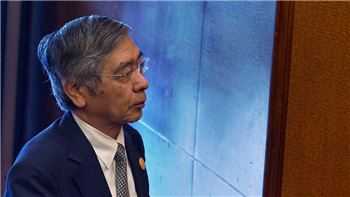(单词翻译:单击)

The Bank of Japan has launched anunprecedented new kind of monetary easing as it set a cap on 10-year bondyields and vowed to overshoot its 2 per cent inflation target on purpose.
日本央行(BoJ)启动了一种史无前例的新型货币宽松,为十年期国债收益率设定了上限,并发誓要刻意地令通胀率超过2%这一目标值。
Its decision demonstrates that even eightyears after the global financial crisis, central bankers are still willing toexperiment with new monetary policy tools, as they struggle to escape from lowinflation around the world.
该行的决定表明,即使是在全球金融危机爆发八年之后,为了竭力摆脱全球性的低通胀,中央银行家们仍愿意尝试新的货币政策工具。
The move marks another effort by HaruhikoKuroda, BoJ governor, to surprise market expectations by doubling down on easypolicy in order to signal his determination for Japan to escape its decades ofon-and-off deflation.
此举标志着,日本央行行长黑田东彦(Haruhiko Kuroda,上图)再次采取了出乎市场预料的行动,加倍押注于宽松政策,以表明他决意使日本摆脱数十年来时断时续的通缩。
But the question for Mr Kuroda is whether 3½years ofslow progress on prices have damaged the BoJ’s credibility toomuch for promises of higher inflation to be taken seriously by the public.
不过,黑田面临的问题在于,由于三年半来在物价方面进展缓慢,日本央行的可信度是否已大幅下降,以至于日本公众根本不会把该行推高通胀率的承诺当回事。
“The price stability target of 2 per centhas not been achieved... [and] this is largely due to developments in inflationexpectations,” said the BoJ. “Inflation expectations need to be raised furtherin order to achieve the price stability target.”
日本央行表示:“2%的物价稳定目标没有实现……这在很大程度上是由通胀预期的发展造成的。通胀预期需要被进一步推高,以实现这一物价稳定目标。”
Markets reacted positively, with the yenlosing 1 per cent to ¥102.7 against the dollar, while Japan’s broadbenchmark Topix index was up 2.5 per cent and the Nikkei 225 rallied 1.8 percent.
市场对此反应积极。日元相对美元下跌1%,至1美元兑102.7日元。日本综合基准指数东证指数(Topix)上涨2.5%,日经225指数(Nikkei 225)上涨1.8%。
The BoJ kept interest rates on hold at minus0.1 per cent —describing further rate cuts as a “possible option foradditional easing”—but announced a new framework with two main elements.
日本央行将利率维持在-0.1%不变,并称“为了实现进一步的宽松可能选择”再次降息。不过,该行还宣布了一个包含两大要素的新政策框架。
The first is a pledge to cap 10-yeargovernment bond yields at zero per cent. In essence, that means the BoJ ispromising to buy any bonds offered for sale at that price.
一是承诺将十年期国债收益率上限设置在零。实质上,这意味着日本央行承诺买入一切以面值价格销售的债券。
Second, the BoJ has pledged to continue buyingassets until inflation “exceeds the price stability target of 2 per cent and stays above thetarget in a stable manner”.
二是承诺继续买入资产,直至通胀率“超过2%的物价稳定目标、并稳定停留在目标上方”。


